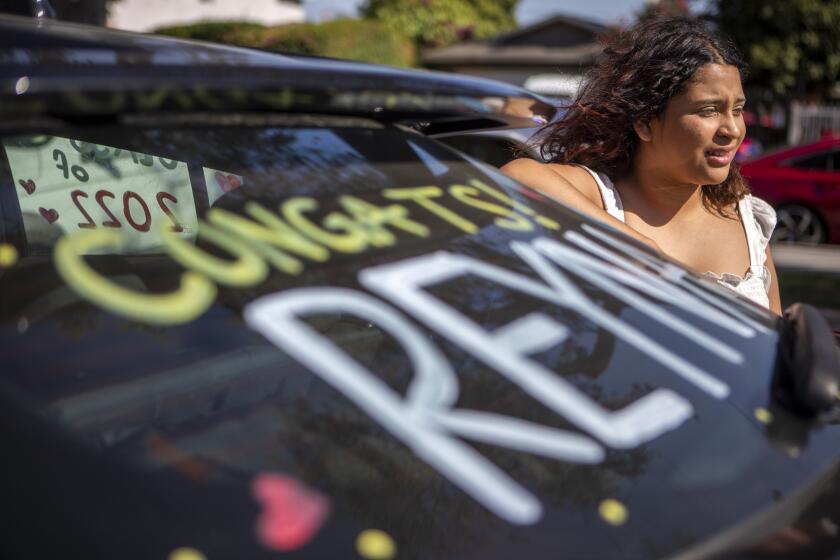Shut out of DACA, and traditional jobs, young immigrants start businesses to get ahead
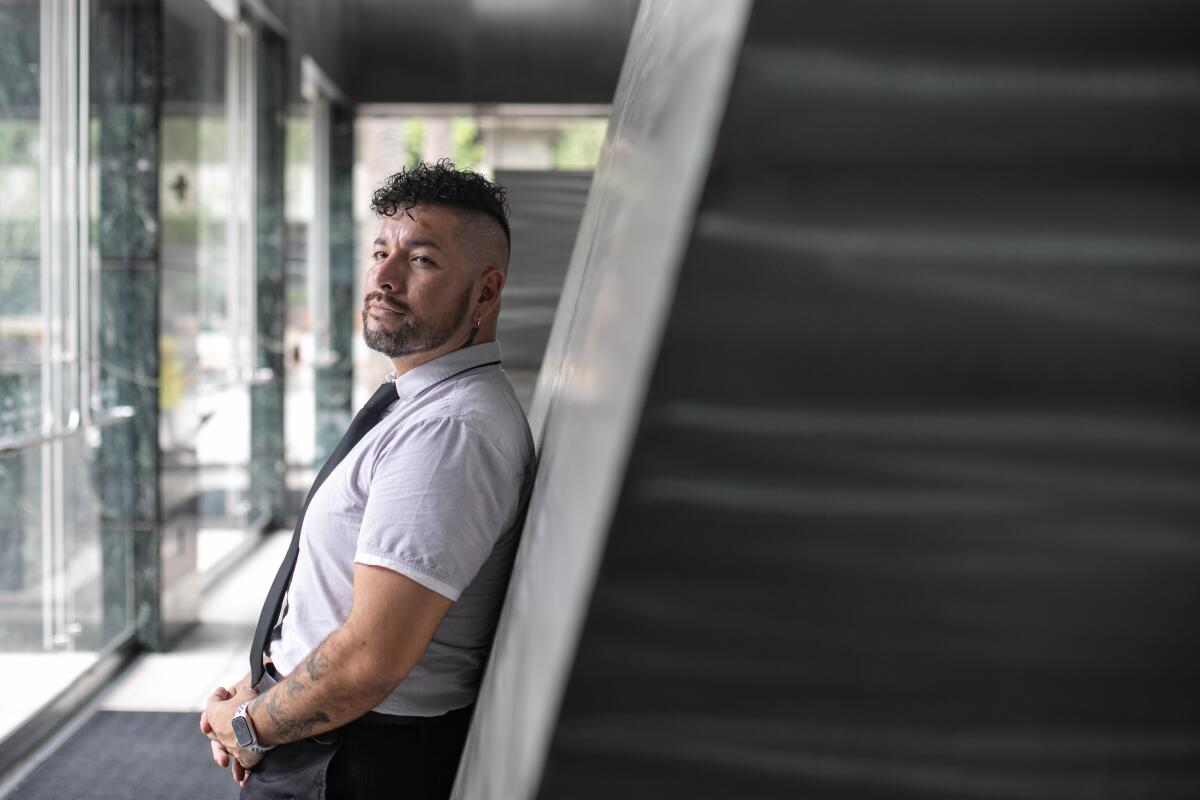
- Share via
Ten years ago, Alessandro Negrete missed out on the Obama-era Deferred Action for Childhood Arrivals program — better known as DACA — a policy that gives certain immigrant youth who were brought to the United States as children a work permit and protection from deportation. In 2008, Negrete had been arrested for being drunk in public and fighting with a police officer. Although he eventually got his record expunged 10 years later, it kept him from qualifying for immigration relief.
His lack of DACA changed the trajectory of his life — pushing him toward success. Now, the 39-year-old, who came from Mexico as a baby with his mother, is an entrepreneur. He earns a six-figure salary as a communications, political and philanthropic strategy consultant. He makes his own schedule. He’s looking to buy his first home in Los Angeles.
“As people of color, growing up in poverty pushes us. I think the added layer of being status ambiguous pushed me even harder,” Negrete said.
Negrete, who launched Alessandro Advisors six years ago, is one of an estimated 820,000 entrepreneurs who are in the country without legal status, a jump from 770,000 in 2016, according to a study by the New American Economy, a research and immigration advocacy think tank based in New York.
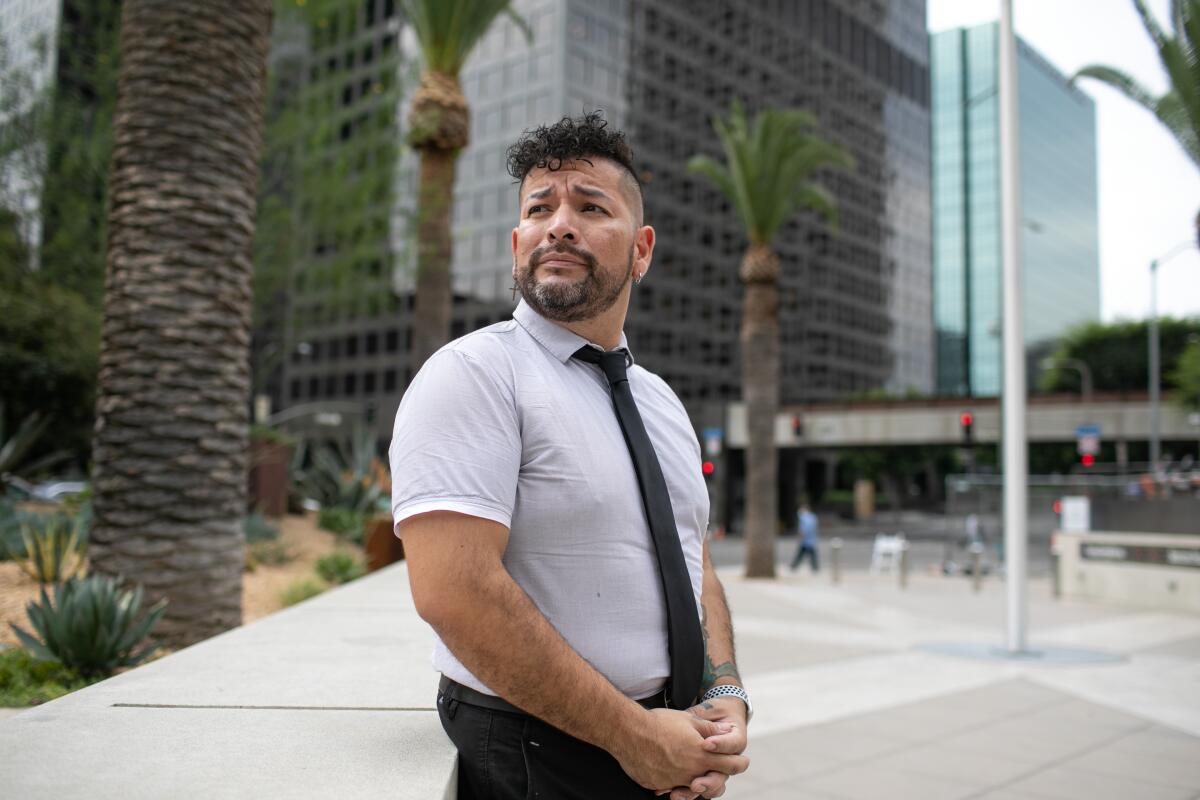
Much of that growth is driven by millennials and younger immigrants, said Iliana Perez, director of research and entrepreneurship at Immigrants Rising, a San Francisco-based advocacy organization that works with immigrant youth who are in the country without legal status. These immigrant youth would have benefited from DACA if then-President Trump hadn’t ended the program five years ago and if a court ruling hadn’t limited the government to granting DACA renewals but not accepting new applications.
Perez said she first noticed immigrant youth taking an interest in entrepreneurship around 2017, when Trump started to unwind the DACA program, shutting out a new generation of recipients.
“This immediately forced a large number of people to think of a Plan B,” Perez said.
Dating for people whose legal status is at best precarious can be fraught with anxiety and insecurity.
This year, an estimated 100,000 immigrant youth, most in California, graduated high school without legal status and without the benefit of DACA, which means that many have been shut out of the labor market. Some will go to college. Others may find work without authorization and with false identification.
But they all have the option to legally work for themselves or even start their own business. Although federal law prohibits employers from hiring someone residing in the country illegally, there is no law prohibiting such a person from starting a business or becoming an independent contractor.
As a result, some young immigrants are forming limited liability companies or starting freelance careers — even providing jobs to U.S. citizens — as the tenability of DACA remains uncertain. This month, the 5th Circuit Court of Appeals is set to release its ruling deciding whether DACA is lawful. Whatever the 5th Circuit decides, the case likely will reach the U.S. Supreme Court.
In 2016, Immigrants Rising launched an Entrepreneurship Fund that provided more than $400,000 in grants to entrepreneurs who lack legal status. In 2021, the state awarded the organization a Social Entrepreneurs for Economic Development Grant of $5.41 million, which allowed the organization to dispense microgrants and provide technical assistance to nearly 800 immigrant entrepreneurs in California in 2021 and 2022.
The microgrants range from $5,000 to $10,000 for immigrants in California who already have a business or are thinking of starting one. The organization also provides entrepreneurial and technical assistance and an entire curriculum — in English, Spanish, Tagalog and Korean — on how to create a business plan and launch a limited liability company or sole proprietorship.
Perez said a little less than half of the organization’s grantees are millennials who got left behind by DACA. An estimated 36% are 18 to 34 years old, she said. A little more than 60% are 35 to 64 years old. About 3% are 65 or older.
“In the absence of comprehensive immigration reform, more undocumented people will be pushed toward entrepreneurship over the next few years,” Perez said.
Some DACA recipients are already preparing, in case DACA falls.

Denea Joseph, a 28-year-old DACA recipient and consultant, said she always had an entrepreneurial mindset, but the program’s precarious situation led her to start her sole proprietorship in 2019.
“Given DACA’s uncertain future, there was no clear path moving forward,” Joseph said. “I needed to make preparations for what’s to come.”
She still works part time but mainly focuses on growing DRJ Consulting, which provides communications and racial equity consulting to immigrant rights organizations.
Joseph didn’t think it was wise to rely solely on DACA, especially given that she’s the primary caretaker for her 86-year-old grandmother. Born in Belize, Joseph left her native country at age 7 to join her grandmother in Los Angeles. Her visa expired and she lost her legal status.
Working for herself would allow Joseph the freedom to eventually live without DACA in a “worst-case scenario.” But her business also gives her something DACA never could.
“Without papers, working for yourself is not only a way to survive,” Joseph said. “In many instances, it’s a way to thrive.”
That’s the case for filmmaker Armando Ibañez, a 40-year-old who lives in Paramount. He said he isn’t sure he’d have had the gumption to start his own film production company in 2020 if he had qualified for DACA.
“If I had had DACA I would have just been an employee at a company and I’d be OK,” he said.
The 40-year-old, who left Acapulco, Mexico, for the U.S. when he was 18, was too old to qualify for DACA. He worked jobs here and there while attending film school but knew he wouldn’t be able to work legally for a film studio. This hurdle, he said, became an opportunity.
Ten years after Obama launched the Deferred Action for Childhood Arrivals program, immigrant youths are graduating high school this year with no immigration relief or protection from deportation.
This entrepreneurial perspective isn’t new and is very much part of many immigrants’ DNA, Ibañez and others like him say.
“Many in our community, we have no other choice than hustling,” he said. “We see street vendors out there. Those are entrepreneurs people don’t talk about. We see señoras selling tamales. ... They may not know it but they are entrepreneurs in the community.”
His lack of legal status has led him to think big and drove him to grow his production company. Ibañez created “Undocumented Tales,” an award-winning YouTube series that follows the journey of Fernando Gutierrez, a queer immigrant from Mexico living in the U.S without legal status. He has other projects on the side, such as creating a short documentary for Lush, the handmade cosmetics company.
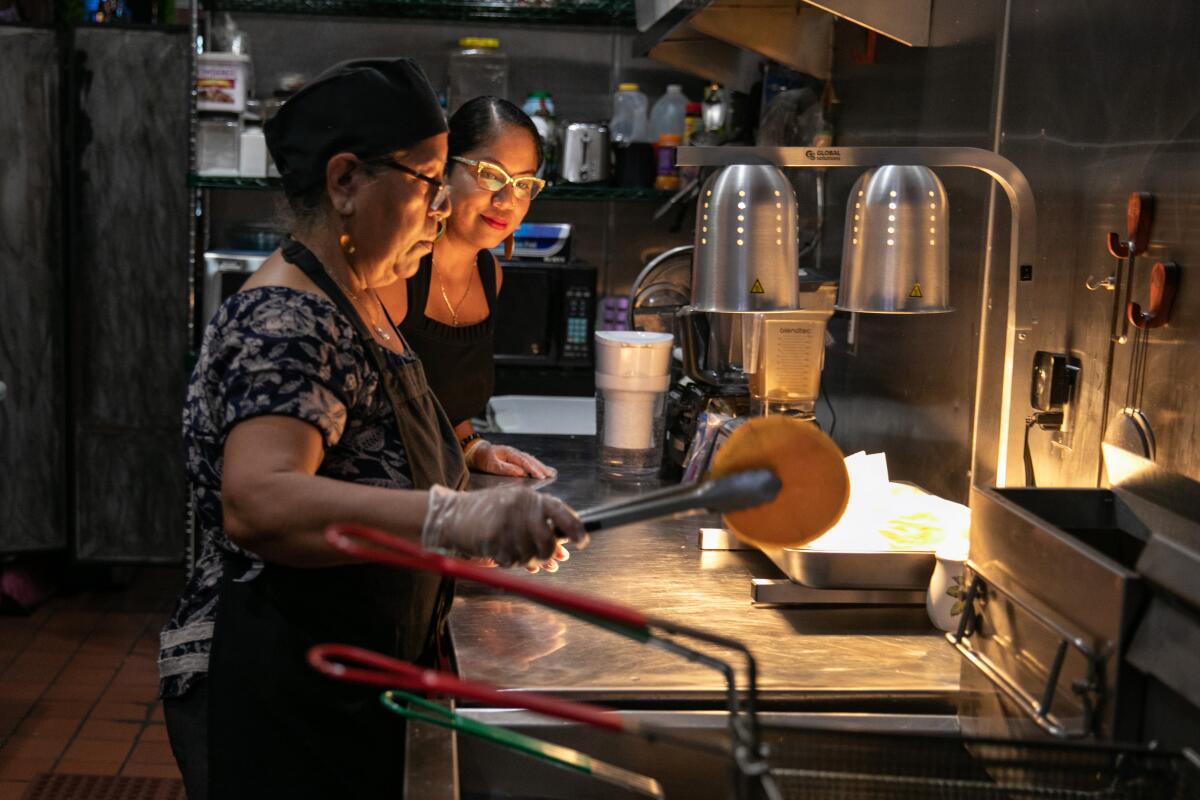
Zacil Vazquez, who was a DACA recipient when she and her mother opened their restaurant, Sazòn, in Huntington Park in 2021, said her lack of legal status has made her “the hustler that I am today.”
“I will tell you that the same stands for a lot of immigrant folks I know, including my mom,” Vazquez said. “They have to work twice as hard to be able to provide for themselves. They have to be able to come to this country, learn the language, learn the customs and make something of themselves.”
But Vazquez, who is a DJ and runs an events production company on the side, recognizes that entrepreneurship isn’t for everyone. Aspiring teachers, nurses and doctors, for instance, rely on their work permits and can’t easily strike out on their own.
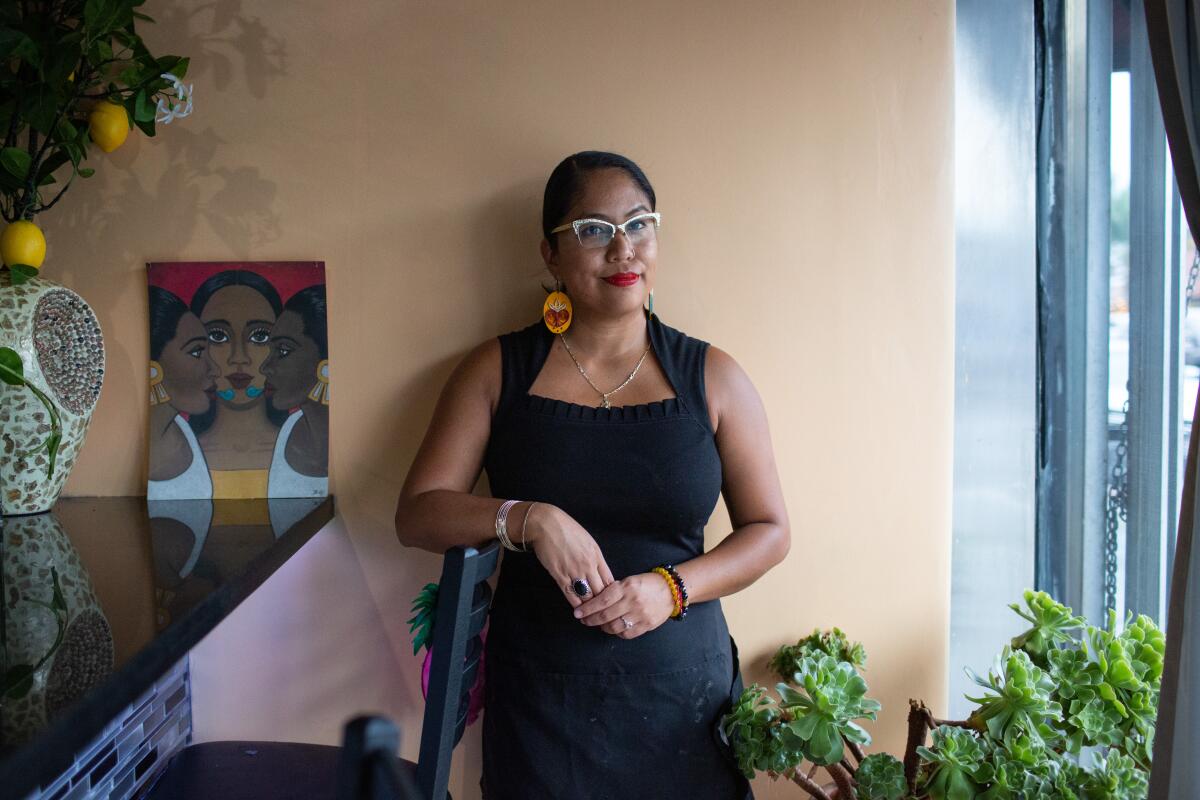
Some relatively immigrant-friendly states, such as California, make it easier for immigrants without legal status and without DACA to start their own businesses. But other states aren’t as friendly. For instance, only a few states — including California — provide full access to all immigrants without legal status to obtain professional licenses. Most other states provide limited accessibility or don’t allow it. Some, like Florida, allow DACA recipients or others who have work authorization to obtain professional licenses.
State bans on professional licenses for people without legal status are largely the result of the 1996 Personal Responsibility and Work Opportunity Reconciliation Act. This legislation prohibits immigrants in the country without authorization from obtaining professional or occupational licenses unless states pass their own legislation to allow it. Some states, such as Arizona and Texas, don’t allow it. Alabama actively prohibits immigrants without legal status from accessing occupational licensure in most or all of the professions that require licensure.
Negrete, who lives in Boyle Heights, provided consulting services to Los Angeles County in developing its L.A. River Master Plan.
But all that hustling can also take a toll, mentally and emotionally, Negrete said.
“For some, you are constantly thinking about where your next meal might come from or whether you’ll be able to pay your rent,” he said. “If you don’t have a support system, it can break you.”
- Share via
Watch L.A. Times Today at 7 p.m. on Spectrum News 1 on Channel 1 or live stream on the Spectrum News App. Palos Verdes Peninsula and Orange County viewers can watch on Cox Systems on channel 99.
More to Read
Sign up for Essential California
The most important California stories and recommendations in your inbox every morning.
You may occasionally receive promotional content from the Los Angeles Times.

